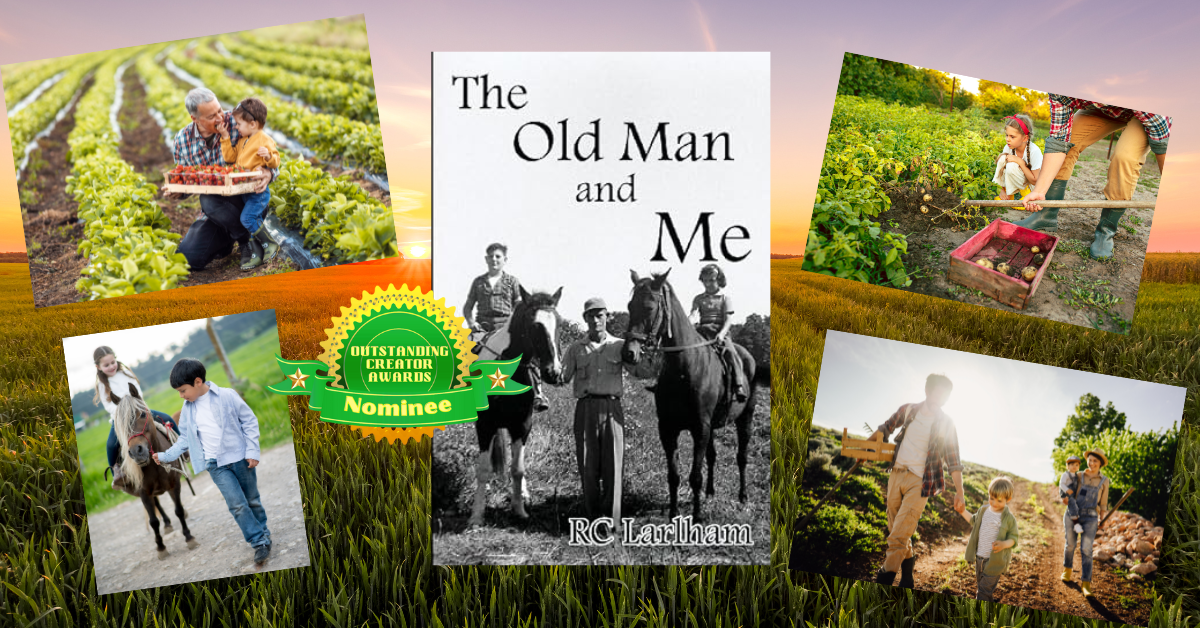|
Paperback Score: 96/100 (9.6 out of 10)
Audiobook Score: 95/100 (9.5 out of 10) We were absolutely delighted by the old-school, farm boy charm of The Old Man and Me by RC Larlham! This is a wonderful, positive, and mostly lighthearted memoir covering the author's life and experiences with his dad, the titular “old man,” in the middle of the 20th century. It's incredibly refreshing and relieving to finally read a memoir/autobiography that doesn't come across as a series of non-stop traumas, stories riddled with abuse and exploitation in machine-gun fashion. We've had just about enough of those for now. This book is the complete opposite. Even when things aren't ideal for the author, there's always an aura of hope, wonder, positivity, and appreciation that oozes from the pages. It's truly uplifting and inspirational! However, the author is able to accomplish this without being over-the-top, ridiculous, or forced. Instead, the presentation is as organic as the watercress on the author's childhood farm. That's something we really appreciated. We never once felt like we were being preached to or told how to think (or what to do). Instead, the author presents the experiences he had with his dad, and we learn along with him. There are so many incredible yet relatable stories in this. The book begins with a bang: a tornado tears through the farmlands surrounding the author's childhood home, and we are treated to a terrifying yet beautiful description of the experience. The rest of the book is never so intense, however, that's not the point. The point of the book seems to be to show what it was like living with your father on a farm in the 1950s. Shockingly, despite taking place in the middle of the Cold War and following World War II, there is very little mention of these conflicts. Why? Because the author and his family literally live in the boonies—the farmland of farmlands out in the middle of nowhere. They can't concern themselves with politics and world events. Their world is literally just their farm, their family, and their tiny rural community. That's something really special and unique about this book. Similar to something like Little House on the Prairie, you get transported to an alien world out in the middle of nowhere, in a time that's far different from our own. However, it's not so unfamiliar as to not be believable or relatable. This is a farm boy's story through and through. These are people who chop their own wood, milk their own goats, and hunt rabbits for sustenance. These are people who go to school with the same 20 people throughout their entire academic career and receive corporal punishment by being whacked on their hands with rulers. These are people who live over 10 miles away from the nearest hospital, and the nearest hospital is an overcrowded mess that often runs out of essential supplies. We found the world and times of this book to be absolutely fascinating! There's a very special way in which the author presents these personal stories. They're presented as vignettes with a payoff in an “epilogue” at the end of each chapter. While this is a bit strange, it does help to make each chapter have a more fulfilling ending and thus be more impactful. For example, in a chapter regarding an uncle who had tried to get the boys to fetch ingredients for his wine, there is an epilogue which reveals what ultimately happened to the last of that uncle's wine. There are some truly heartwarming things in the book, particularly the beautiful relationship between the author and his father. The old man in this book is one of the most comforting and incredible figures in any book we've ever read. Yes, that's true even when he's swearing incoherently when his lawnmower gets stuck on weeds. The old man is an example of a phenomenal father who would do anything for his children. That's such a welcomed thing to read about after reading so many books about abusive and neglectful fathers. The old man is always looking out for his sons' welfare. Even when confronting with the prospect of bringing nanny goats into the home, the father only agrees to it if they are safe around the kids. The lessons he teaches, such as how to take care of animals and how to work the land, instill in them a sense of discipline as well as skills they will take with them for the rest of their lives. One of the other heartwarming parts of the book is the author's relationship to his blind pony, Bellsie, however brief. It's a somewhat painful but also rewarding experience. There are other interesting things here and there. For example, there's crazy Aunt Viola who is hyperreligious. There's also the aforementioned wine-making uncle, Ike. The book also does a good job at using motifs. For example, there's the reoccurence of the blackbird, the “harbinger of spring,” who sings a distinct song familiar to both the author and his father. Moving on to the audiobook... the audiobook is also incredible! The narrator that was chosen had a perfect southern accent and deep tone to match the spirit of the book. There were times, however, that we felt it could've used a reread or second recording. There were times we thought that the narrator could have prepared a little bit better. The most notable example is how he pronounces “Nina” as “NYE-nuh” when it is clearly supposed to be “NEE-nuh.” There are also times when the narrator stumbles a little, pauses, or hesitates in the middle of sentences or passages. However, it really isn't bad enough to take away the incredible experience of the audiobook. We highly recommend both! Check them out on Amazon!
0 Comments
Leave a Reply. |
Archives
July 2024
Categories |

 RSS Feed
RSS Feed